Exactly one year ago, on 13 March, TU Delft’s campus went on lockdown. Five staff members look back at the past year. “As soon as we can, I will go back to campus.”
Corona measures in TU Delft Library. (Photo: Dalia Madi)
What stands out the most in this crisis year for TU Delft staff members? That they are seeking each other out more. That they have the binding factor of everyone working with – or against – the same problem. That they are tired. Tired of having to change things constantly, tired of the crisis.
Alone in the lecture hall: ‘It’s eerily quiet when you make a joke’
EEMCS teacher Stefan Hugtenburg was supervising an exam with 400 students in a lecture hall when he heard about the lockdown. “I was pleased that we did our midterm. At least it was done,” he says looking back. At the end of the day, he emailed his students. ‘I can barely believe it, but as of tomorrow, I will be on Twitch. I will give my lessons there.’ Since then, he has started using Zoom instead of Twitch. And Hugtenburg has swapped his living room for the lecture hall. He and a colleague teach their lessons live. “I prefer the lecture hall. It feels more ‘real’.” During the online lessons, students can ask questions on the live chat which are read out by a colleague. “We always tried to encourage questions anyway, as they helped us go into the subject in depth. I’m pleased that we can still do this online.”
What does Hugtenburg miss the most from pre-corona times? He misses the small things that make learning easy and fun, and the interaction among students. “I often asked students to work in groups, to solve a particular problem for example, during lectures. You cannot avoid your neighbour in a lecture hall. There is almost automatic contact.” This is more difficult remotely. “I also make jokes during the lessons. Most students don’t have their webcams and sound on so if I make a joke, it is eerily quiet.”
Teaching at TU Delft has changed significantly over the last year. From fully online during the first lockdown to physical lessons for first years in the first few months of this academic year, to then return to completely online teaching. For Hugtenburg, the biggest change is the exams. He and his colleagues are putting almost all their time into these now. Like other TU Delft staff members, the corona crisis is very energy intensive. “The ups and downs are more extreme than usual,” he says. He does not have to teach this semester. “I’m looking forward to it much more than usual. I will then finally have the time to do all sorts of educational things that I have had to put off over the last few months.”
He hopes that once the corona crisis has passed, TU Delft will revert back to mostly physical classes. “Things like Q&A sessions work well online, but for most aspects of learning, physical classes are just that much better,” he says. “As soon as we can, I will go back to campus.”
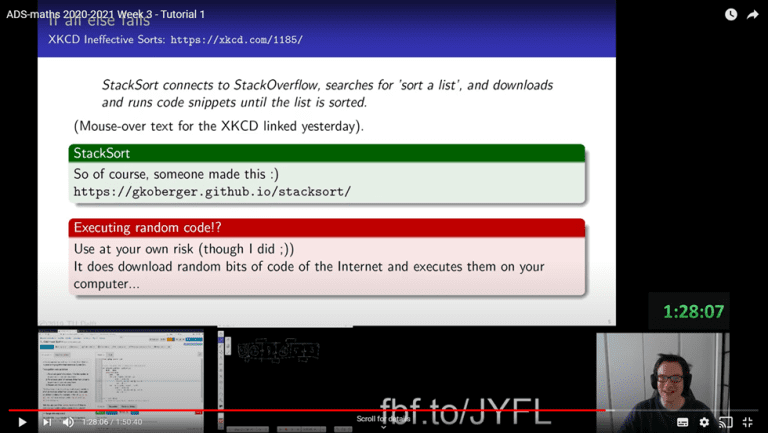 A lecture of Stefan Hugtenburg. (Photo: Stefan Hugtenburg)
A lecture of Stefan Hugtenburg. (Photo: Stefan Hugtenburg)
MS Teams? ‘It’s like doing a marathon in sprints’
Having a meeting with your colleagues in Teams in the morning, then posing a question on the chat, then video calling a colleague at midday. After a year of working at home, a day like this seems the most normal thing in the world. Still, there were plenty of hiccoughs in making platforms such as Zoom and MS Teams available to all TU Delft staff members and students. Product owner Bart Alleblas and Service Portfolio Manager Eveline Daems of IT look back on – what else? – MS Teams.
When TU Delft staff members started working at home en masse, TU Delft was still only offering Skype for Business as the video calling platform. And this while teachers had to start giving lessons online from one day to the next. Many teachers found solace in Zoom, but TU Delft did not have a campus licence for Zoom. Daems and her team had to arrange things so that everyone at TU Delft could use the platform. “We rolled out Zoom in record time,” says Daems. “On 25 March I received the order, we bought Zoom on 26 March and one day later it was available through tudelft.zoom.us.” It was hard work. “I worked 12 hours a day as there’s more to it than just buying Zoom. You have to be in contact with America, have your documentation in order, coordinate with other departments such as ESA, and arrange a lot of other things. And do all this in a couple of weeks.” At present, Zoom has about 19,000 active users at TU Delft, most of whom are students and teachers.
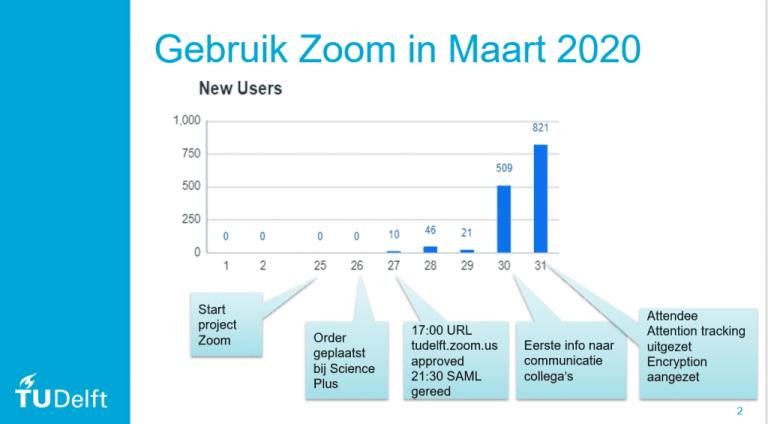
From April last year, IT was also asked to make MS Teams available for all staff members and students. MS Teams has fewer privacy objections and it offered more support. Alleblas explains that “Implementing a new system usually takes about one-and-a-half years, but we did it in a couple of weeks. I am really proud of this.” It also meant working long days. “It was like doing a marathon in sprints. Running to get something done, then standing still to check if it all works, and then running again to the next point.” What did Alleblas enjoy the most about doing all this? “I have the feeling that we started working differently. I don’t mean working at home, but communicating differently. We chatted more, video called more and emailed less. Now I even get irritated if someone sends a long email. Why don’t they phone or chat in Teams?”
Just like teacher Hugtenburg, Daems and Alleblas also find the corona crisis draining. “I am still tired from rolling out Zoom,” grins Daems. What about working at home? Alleblas says that “A colleague expressed it well: six months ago I was working at home, but I now sleep ‘at the office’.” They do, however, see some advantages in the last year. For Alleblas, one of these is that “People at TU Delft from different departments and faculties are seeking each other out more. Previously, your manager did all the consultation work with other faculties.” Daems continues. “Now you just invite a colleague from another department to join an MS Teams meeting.”

Eveline Daems and Bart Alleblas in an MS Teams meeting with Delta editor Annebelle de Bruijn.
Puzzling over traffic flows: ‘You need to think in a completely different way’
Soon after the first lockdown, the inbox of Policy Officer Mobility and Accessibility Ingeborg Oostlander (Campus and Real Estate) was a lot quieter. The campus was so empty and quiet that all sorts of everyday issues temporarily faded into the background. But from the summer onwards it was full steam ahead. In this period, Oostlander and her colleagues prepared the campus for the new academic year in which some of the students would have physical classes. And more students meant that more teaching and support staff would come to campus. “We had to work out what we could expect in terms of traffic flows from all sorts of traffic – pedestrians, cyclists, cars, public transport. We had to anticipate where any hold ups would be. You don’t want cyclists to be unable to keep their distance if they have to wait for the Abtswoudsebrug bridge or a traffic light,” she explains. All in all, it was quite a puzzle. “But it was fun and challenging. You suddenly have to think in a completely different way.”
She was already very familiar with the regular traffic flows on campus, but a temporary phase with partial physical classes? There was no data on this. Oostlander and her colleagues not only sought out the traffic experts at the municipality of Delft and public transport companies, but also gathered information from the faculties. They needed to know where the faculties wanted their students to enter the buildings, what time the lectures were to start and so on. Where they thought there may be problems, Oostlander and her colleagues made adjustments. One example is that, after discussions with the municipality, stickers and boards were placed on the Abtswoudsebrug. Another is the diversion of part of the cycling route to the Faculty of 3mE on the, previously, busy Mekel cycling path. With hindsight, not all the measures were necessary. “We had stewards at TU Delft’s busiest bus stop in front of the Aula to help people maintain distance. However, the bus stops were so quiet that the stewards were not needed.”
Now that TU Delft has a mobility dashboard, designed by researcher Sacha Hoogendoorn and colleagues, Oostlander has hard data at her fingertips. “It is great. There were physical exams at X in January and I could see exactly how the traffic flows went and if students were able to keep distance.” At present, it looks like physical classes will gradually resume again in March onwards, and this means more work for Oostlander.
While working at home means that she misses all those amicable chats at the coffee machine, she does see advantages. “Everyone is working on a shared problem, the problem being to have things run as smoothly as possible despite the corona restrictions. This has made TU Delft staff members from different departments seek each other out much more.”
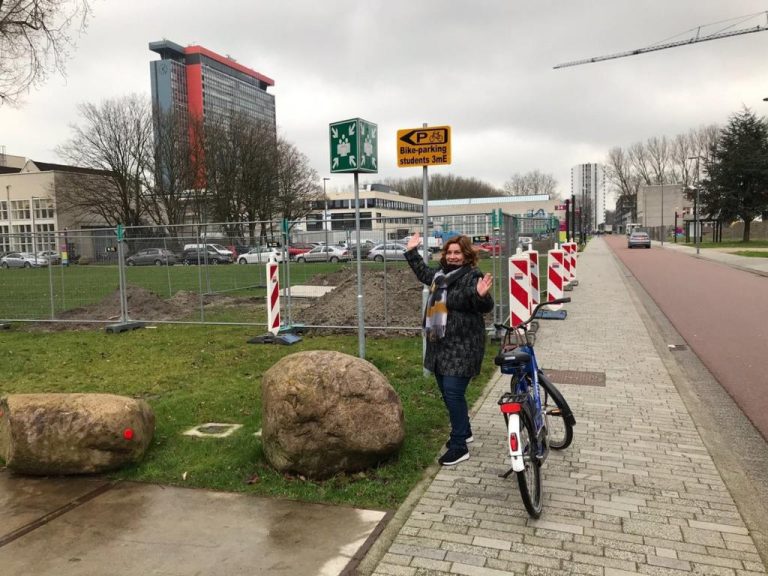
Ingeborg Oostlander puzzling over traffic flows. (Photo: Ingeborg Oostlander).
Doing business in times of crisis: ‘We are still here thanks to our regulars’
While TU Delft continued to operate unabated, the hospitality industry came to a virtual standstill. The last year has been very difficult for many in the food and beverage industry. This was the case for small business owner Romy de Lizer, owner of the ’t Je van het Loket – Mexicaans foodtruck. De Lizer is just cleaning up when Delta turns up for an interview. A client or two pops by for a last minute snack. “Would you like normal spicy or extra spicy?” she asks a hungry student. The orange and white bus has stood on campus every Tuesday and Thursday between 11:00 and 15:00 for the last few years. On the other days, De Lizer is usually busy catering for weddings, parties and festivals. However, the corona crisis has put paid to these activities. “The first lockdown was particularly hard,” she says. “Sitting at home unemployed for all those months was hard for me. We then started new concepts such as lunch boxes and dishes of tapas, but financially it was scraping the barrel.”
De Lizer and other ‘truckers’ returned to campus in June last year. Her work allows clients to maintain enough distance from each other. “We did a lot more preparations for the lunches so that people only needed to wait briefly and it did not get too busy.” It is thanks to her regulars – “I see them coming and I know exactly what they are going to order” – that she has got through these months. When the Netherlands went into the second lockdown in December, she desperately phoned CirFood, the company that supplies the catering on campus, and asked if she and the other truckers could please open. After all, takeaways were permitted. They were given permission. “Luckily as we would not have survived staying at home again.”
She started seeing that things were getting better at the beginning of this month. The people at TU Delft were coming to campus more often for projects, exams or meetings. And they know exactly where to find her food truck. While the uncertainty of the corona crisis is taxing, she is happy that she still has her food truck. “We are still here thanks to our regulars.”
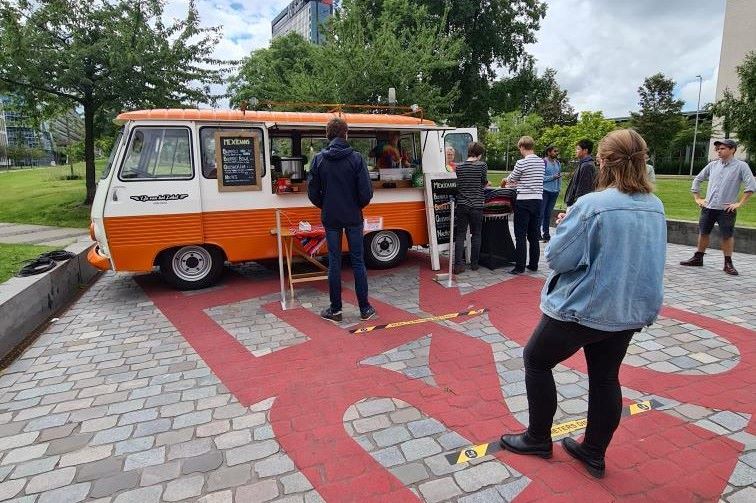
Romy de Lizer’s food truck is there every Tuesday and Thursday. “We are still here thanks to our regulars.”
- In an email sent to staff members, the Executive Board too looks back at the past year. “We have paid a high price in social and economic terms. At TU Delft, this is perhaps most noticeable among our students. The longer the crisis lasts, the more they miss out on an important part of their education, while their mental well-being is also at stake.”
Do you have a question or comment about this article?
a.m.debruijn@tudelft.nl

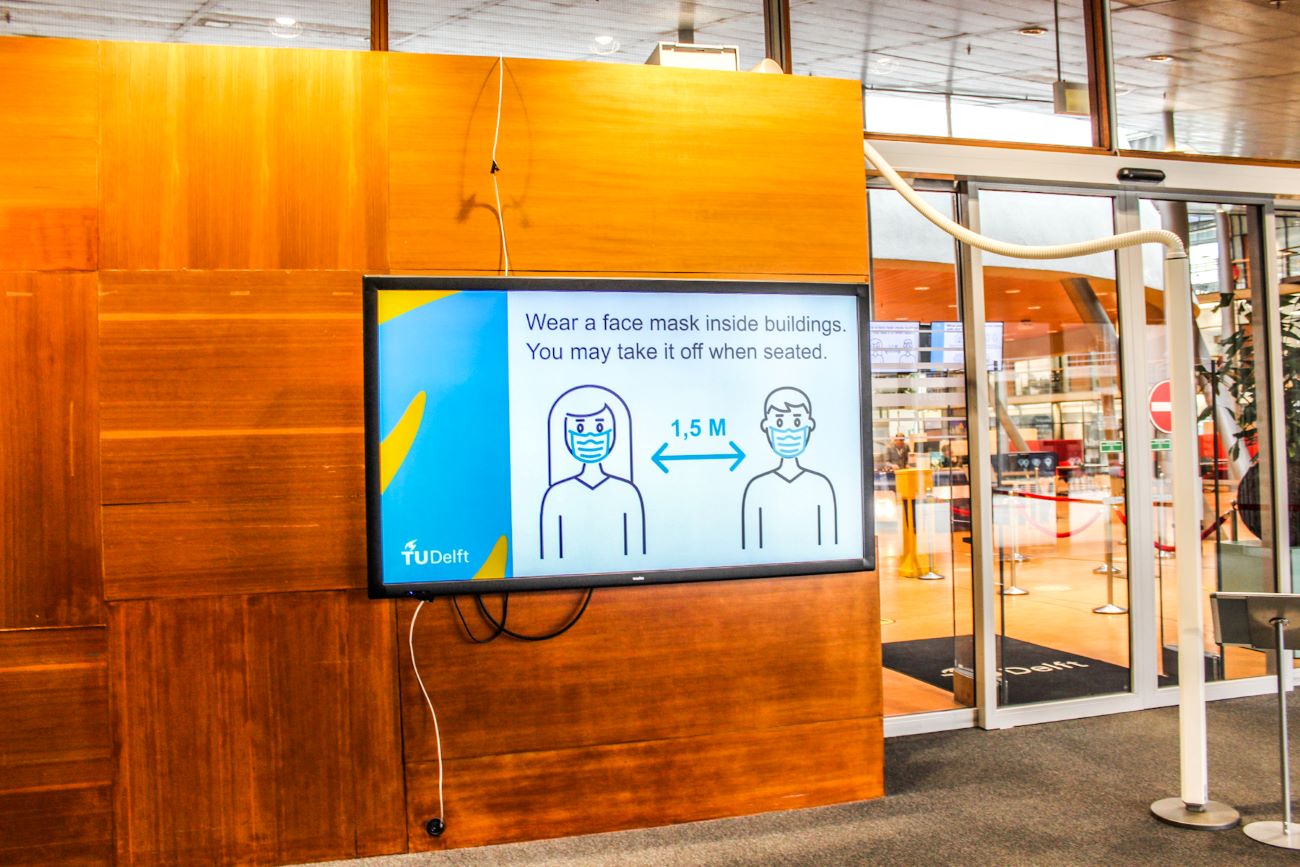
Comments are closed.